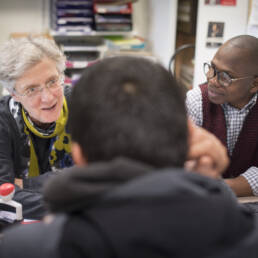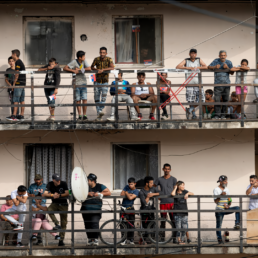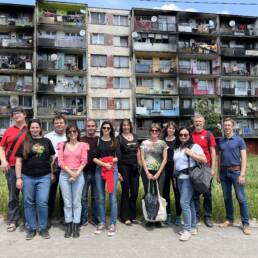Download the full report
In the wealthy European Union too many people suffer poverty and inequalities are on the rise.
Since the start of the financial crisis in 2008 and the adoption of the Europe 2020 Strategy by the (then) 27 Member States, Caritas in Europe has been increasingly raising its voice to denounce a structural worsening of social systems offering protection and ways of integration into society and labour market to the people at risk of poverty. With concern we observe the progressive paradigm shift in Europe, where a balanced approach between wealth and investment in people – welfare – is being given up in favour of an exclusive focus on public budgetary stability (austerity) and growth. The negative impact on individuals and social cohesion is already huge. We call for seeing the link between economic decisions and people and we urge to put people first and the economy and economic policies at the service of the people.
While designed to perform at their best in times of crisis, social protection systems have been greatly affected by austerity policies, with increasing levels of unemployment, poverty and social exclusion. Inequalities stand at an unprecedented level. About 123 million people are experiencing poverty today in Europe, and the gap between the rich and poor has widened, as disposable income is unevenly distributed.1 According to a World Bank report, recovery is gaining strength because it is fuelled by consumption, especially household consumption. But never before has the consumption of luxury goods been so high.2
According to a recently published ILO study, 27 EU Member States took over 500 labour market reform measures between 2008 and 2013. Hardly any of them actually resulted in more jobs and in 56% of the measures, the employee was worse off. And even if unemployment is declining, it doesn’t mean that more people are better off now. Unemployment rates are reaching pre-crisis levels in some countries and in-work poverty is increasing.
Yet even before the crisis, 120 million people were living in poverty, indicating that social protection systems were not performing adequately then either. Nevertheless, the crisis has relaunched the debate about the organisation of solidarity in society. This European report aims to contribute to this debate, addressing fundamental principles in regard to safeguarding the inalienable human dignity of all members of society. This should not be a budgetary discussion; it is a political debate requiring political courage and visionary leadership.
Caritas believes that adequate policy decisions and measures taken now can lead to a considerable reduction in extreme poverty and increasing inequalities, necessary for addressing the concerns of the people presented in this report. This, in turn, will contribute to economic growth, social cohesion and more well-being in Europe. I invite you to consider our recommendations for action and to contribute to their achievement, as policy maker, decision maker, or activist. It’s time now to end poverty and reduce inequalities!
This report, based on evidence collected by Caritas organisations across Europe,3 identifies concrete causes of poverty, inequality, and exclusion rampant in European societies and formulates recommendations to address them. This report is within the Caritas Cares Series,4 and presents the main problems facing groups of people at risk of poverty and social exclusion, indicating what the most urgent political action required of policy makers is (chapter 3). It highlights a set of fundamental rights that people experiencing poverty and social exclusion are least able to access (chapter 4). Chapter 5 applies Caritas’ grassroots experiences to the assessment of current policy tools that may have the potential to reduce poverty and social exclusion, while chapter 6 draws important conclusions, forming the basis for Caritas Europa’s Policy Recommendations (chapter 7).
Notes:
1. World Bank (2015): “Sustaining Recovery, Improving Living Standards” http://www.worldbank.org/en/region/eca/publication/eurer.
2. The wealthiest 1% of the global population now owns more than 50% of global wealth.
3. The methodology used to compile this report entailed the analysis of data gathered from Caritas Europa Member Organisations (MOs) by means of a questionnaire containing 22 questions (plus sub-questions) of the following types: multiple-choice, ranking and open response. The data compiled reflects the grassroots experiences of the MOs that evaluated a set of policy documents (European Commission Recommendations, European Semester documents, etc.) and their policy application in the respective countries. Additional data was drawn from Caritas internal documents, publications, and conversations with Caritas Europa MOs working with recently arrived migrants and refugees. In order to compare Caritas’ key observations with state of the art research, a series of secondary literature and official statistics were consulted, allowing for a structuring of the observations into a systematic framework, leading to concrete policy recommendations, which can be found at the end of this document.
4. The Caritas Cares Series is a continuation of previous monitoring efforts by Caritas Europa, such as the Europe 2020 Shadow Reports 2011-2014 and the Crisis Monitoring Reports 2013-2014, but it also marks a new approach due to the differentiated methodology applied. This European overview is based on the findings presented in the Caritas Cares National Reports, which in turn, identify major issues of concern regarding policy approaches in various countries requiring immediate policy action, according to Caritas member organisations.
More information
Peter Verhaeghe
Senior Policy and Advocacy Officer
Tel: +32 (0)2 235 03 96
Mob: +32 (0)478 58 54 33
pverhaeghe@caritas.eu




